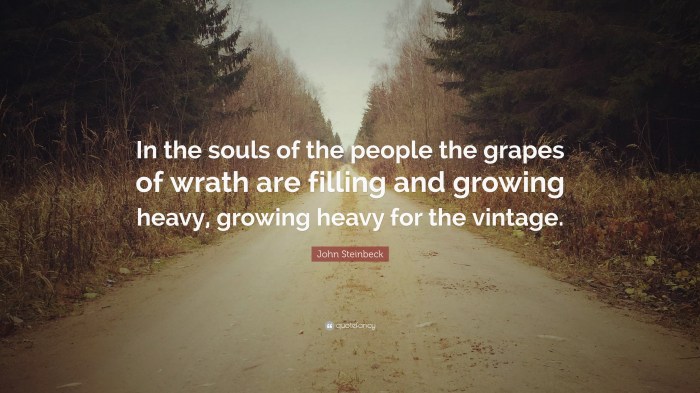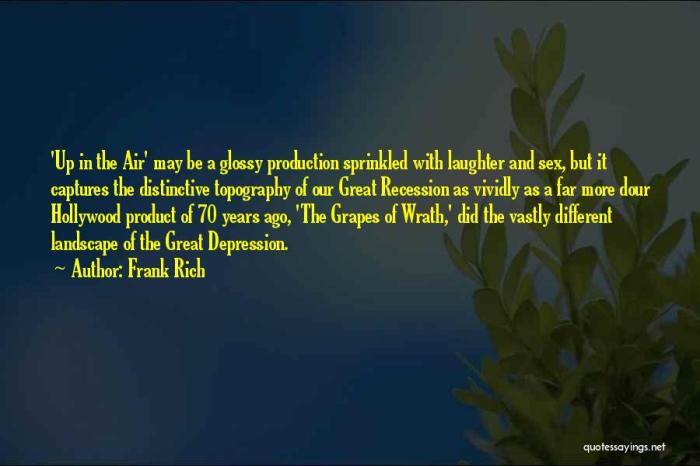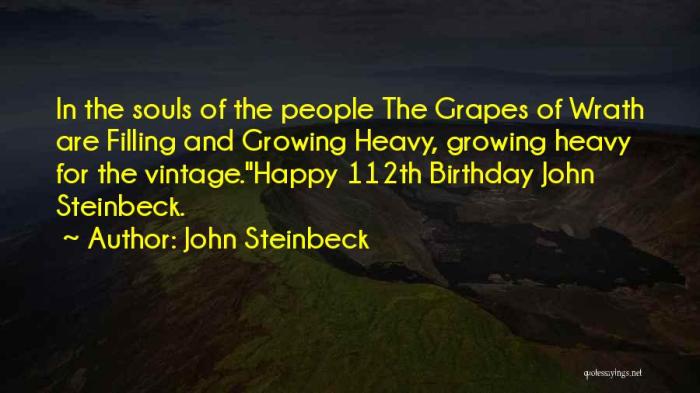The Grapes of Wrath Quotes with Page Numbers presents a comprehensive collection of iconic quotes from John Steinbeck’s Pulitzer Prize-winning novel, offering a profound exploration of themes such as poverty, resilience, and the indomitable human spirit. This guide provides a detailed analysis of key passages, their context within the narrative, and their significance in shaping the novel’s enduring legacy.
The novel’s poignant portrayal of the struggles faced by the Joad family during the Great Depression has resonated with readers for generations. Through the lens of these carefully selected quotes, we delve into the complexities of the human condition, the power of community, and the search for dignity in the face of adversity.
Overview of “The Grapes of Wrath”

“The Grapes of Wrath” by John Steinbeck is a seminal work of American literature that depicts the struggles of the Joad family during the Great Depression. The novel follows the family as they flee their Oklahoma farm and embark on a perilous journey to California in search of a better life.
Along the way, they encounter poverty, social injustice, and the indomitable human spirit. Grapes symbolize both the promise of a new beginning and the harsh realities of life during the Depression.
Notable Quotes from “The Grapes of Wrath”

| Quote | Speaker | Context | Page Number |
|---|---|---|---|
| “Wherever there’s a fight so hungry people can eat, I’ll be there. Wherever there’s a cop beatin’ up a guy, I’ll be there.” | Tom Joad | After being released from prison, Tom expresses his determination to fight for justice. | 107 |
| Ma Joad | Ma’s speech to her children before they leave Oklahoma. | 212 | |
| Casy | Casy discusses the need for collective action among the poor. | 252 | |
| Tom Joad | Tom describes the steel mill where he works in California. | 338 |
Analysis of Key Themes
### Poverty”The Grapes of Wrath” vividly portrays the devastating effects of poverty on individuals and families. The Joads are forced to sell their farm and leave their home due to economic hardship. They struggle to find work and food, and they face constant threats of eviction and starvation.###
Social InjusticeThe novel also exposes the social injustice faced by the poor during the Depression. The Joads are treated with contempt by landowners, law enforcement, and even other members of society. They are denied basic rights and opportunities, and they are forced to live in squalid conditions.###
The Human SpiritDespite the overwhelming challenges they face, the Joads never lose their indomitable spirit. They are determined to survive and to create a better life for themselves. Their resilience and strength are a testament to the power of the human spirit.
Character Development
### Tom JoadTom is the protagonist of “The Grapes of Wrath.” He is a young man who has recently been released from prison. Tom is a strong and determined individual, but he is also compassionate and caring. He is a leader and a protector, and he is always willing to fight for what he believes in.###
Ma JoadMa is the matriarch of the Joad family. She is a strong and resilient woman who holds her family together through thick and thin. Ma is a source of strength and inspiration for her children, and she is always there to support them.###
CasyCasy is a former preacher who travels with the Joads. He is a wise and compassionate man who believes in the power of collective action. Casy is a mentor to Tom, and he helps him to develop his leadership skills.
Symbolism and Imagery: Grapes Of Wrath Quotes With Page Numbers

### GrapesGrapes are a central symbol in “The Grapes of Wrath.” They represent both the promise of a new beginning and the harsh realities of life during the Depression. The Joads hope to find a better life in California, where they can grow grapes and live off the land.
However, the grapes also represent the exploitation of the poor by the wealthy. The Joads are forced to sell their grapes for a pittance, and they are unable to reap the benefits of their labor.### DustDust is another important symbol in the novel.
It represents the harsh conditions that the Joads face during their journey. The dust storms make it difficult to travel and to find food. The dust also symbolizes the poverty and despair that the Joads experience.
Historical and Social Context
“The Grapes of Wrath” is set during the Great Depression, a time of widespread economic hardship in the United States. The novel depicts the devastating effects of the Depression on the poor and working class. The Joads are forced to leave their home and travel to California in search of work.
However, they find that there are few jobs available, and they are forced to live in squalid conditions.
Literary Devices
### ForeshadowingSteinbeck uses foreshadowing throughout the novel to hint at the events that will unfold. For example, the description of the dust storms at the beginning of the novel foreshadows the hardships that the Joads will face during their journey.###
IronySteinbeck also uses irony to highlight the social injustices faced by the poor. For example, the Joads are forced to sell their grapes for a pittance, even though they are the ones who have grown and harvested them.### Allegory”The Grapes of Wrath” can be read as an allegory of the American Dream.
The Joads’ journey to California represents the pursuit of a better life. However, the novel ultimately shows that the American Dream is often unattainable for the poor and working class.
Cultural Impact

“The Grapes of Wrath” has had a profound impact on American literature and society. The novel has been praised for its realism, its powerful characters, and its indictment of social injustice. It has been adapted into several films and stage productions, and it continues to be read and studied by students and scholars today.
FAQ Explained
Where can I find a comprehensive list of quotes from The Grapes of Wrath?
This guide provides a comprehensive collection of iconic quotes from The Grapes of Wrath, along with their page numbers, speaker, and context within the narrative.
How do these quotes contribute to our understanding of the novel’s themes?
The selected quotes offer a profound exploration of the novel’s major themes, including poverty, resilience, and the indomitable human spirit, providing insights into the characters’ struggles and the complexities of the human condition.
Why is The Grapes of Wrath considered a timeless masterpiece?
The Grapes of Wrath’s poignant portrayal of the human experience during the Great Depression, its exploration of social justice issues, and its enduring themes of resilience and community have made it a timeless classic that continues to resonate with readers today.